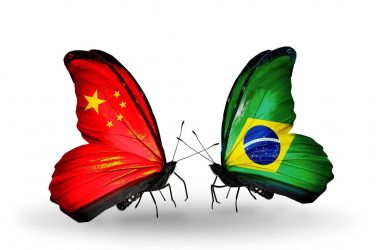Russia and Brazil will consider the possibilities of building new nuclear power plants in the country, as well as cooperation in the sphere of radiation technologies and nuclear medicine, the countries’ leaders said in a joint statement Wednesday.
“Russia and Brazil will consider ways to expand cooperation in the peaceful uses of nuclear energy in the following areas: radiation technologies and nuclear medicine, nuclear fuel cycle, training and upgrading of skills of specialists in the use of nuclear energy for peaceful purposes, completion of the third power unit of the Angra nuclear power plant, as well as the construction of new nuclear power plants in Brazil,” it said.
“There are prospective projects in the nuclear power industry. In the beginning of this year, the Russian company Rosatom won a tender for the supply of uranium for Brazilian nuclear power plants… The company… would like to receive a contract for the construction of a spent nuclear fuel storage facility at the site of the Angra NPP in the state of Rio de Janeiro,” Putin told reporters.
Russian energy giant Gazprom is interested in the establishment of liquefied natural gas supplies to Brazil and construction of underground storage facilities for it, the materials ahead of the meeting of Russian and Brazilian leaders read.
“A branch of Gazprom is operating in Rio de Janeiro. The company is interested in establishment of liquefied gas to Brazil, import of Brazilian equipment for gas production facilities on the sea shelf, as well as in participation in the construction of underground storage facilities for LNG,” the documents read.
Space
Russia and Brazil are considering the possibility of conducting joint launches of carrier rockets from a Brazilian space center, Putin revealed.
“We are looking into the possibility of conducting joint space launches from Brazil’s launching site, as well as of constructing small- and medium-lift launch vehicles. We also have ideas on establishing cooperation in remote Earth sensing,” the Russian leader said after his meeting with Temer.
Putin stressed that Russia and Brazil closely cooperate in peaceful space exploration, and recalled that four foreign stations of the Russian global navigation system Glonass are operating in Brazil.
Temer, in his turn, said he gave a positive assessment to construction of the Glonass stations on Brazilian soil, and expressed interest in expanding the network of such stations.
The Brazilian Space Agency operates two launch centers, the Alcântara Launch Center on the northern peninsula of the same name, and the Barreira do Inferno Launch Center, which is used as support to the first one.
Glonass, a global navigation system operated by the Russian Aerospace Forces, consists of 27 satellites, 24 of which are operational. The system allows real-time positioning and speed data for surface, sea and airborne objects around the world.
Currently, there are eight Glonass stations located outside Russia, with four of them in Brazil, three in the Antarctic and one in South Africa.
Terror
Russia and Brazil are ready to boost bilateral cooperation in a wide range of spheres, including the defense industry, trade and the economy, as well as the nuclear energy sector, the Russian and Brazilian leaders said in a statement on Wednesday.
The two leaders also agreed to deepen coordination in the fight against terror.
“We have just signed a joint statement with the president on strategic foreign policy dialogue, which provides for a higher level of coordination and efforts by our countries in combating new challenges and threats, terrorism, supporting peace, stability, non-proliferation, and armaments control,” Putin told reporters after the meeting with his Brazilian counterpart.
The Brazilian President arrived in Moscow on Tuesday for a two-day visit and talks with the Russian leaders.
Paulo Nogueira Batista Jr., the Vice President of the country’s New Development Bank, said that the visit of the Brazilian leader comes as confirmation of the important role Brazil assigns to one of its key partners in the BRICS (Brazil, Russia, India, China and South Africa) format.
The banker stressed that ten years ago, the association of five major emerging national economies started with a dialogue between Russia and Brazil, which then extended to other states.
Nowadays, he said, the association has very promising prospects, including China’s New Silk Road project, One Belt, One Road. Brazil’s New Development Bank, which opened its branch in Shanghai in 2015, is set to participate in this project alongside other multinational banks. It has already inked an agreement with the Chinese government under which it is going to finance this infrastructural project.
Cybersecurity
Russia’s Kaspersky Lab IT company has started developing special cybersecurity software on behalf of the Brazilian Defense Ministry and several banks.
“Russia’s Kaspersky Lab company is expanding a range of services at the Brazilian market. The company has started development of special cybersecurity software on behalf of the Brazilian Defense Ministry and several major banks,” the documents said.
According to the documents, Moscow and Brasília are also cooperating in the sphere of development of software and the use of Russian technologies in the Brazilian system of e-government services.
The documents added that a number of other Russian companies, such as payment service provider Qiwi and remote banking services system Megapay, are also working in Brazil or participating in tenders on the provision of software to the Latin American nation.
Human Rights
There are certain complaints against the European Court of Human Rights’ (ECHR) decisions, but it is too early to estimate the prospects of alternative to the organization proposed within the framework of the BRICS organization, a member of the Council for Civil Society and Human Rights told reporters.
Yelena Sutormina, the chair of the Russian Civic Chamber’s Committee on Public Diplomacy and Support for Compatriots Abroad, informed that the Civic Chamber had plans to send a proposal to the Russian Foreign Ministry to create an alternative to the ECHR within the framework of BRICS.
“It is too early to estimate this initiative — there are more questions than answers. It is necessary to give assessment to the ECHR decisions and if you do not agree with them — to release your arguments,” Alexander Brod said, adding that ideas of creation of yet another human rights courts had been repeatedly voiced during the recent decade, but such initiatives had not gone any further.
The official added that despite several claims against the ECHR, a new institution would have its own minuses.
“Of course there are complaints against the ECHR. We, as human rights activists, monitoring its activities and the decisions, have repeatedly faced a political bias of this body…
“BRICS comprises five countries [Brazil, Russia, India, China and South Africa] and the ECHR is the basis for protection of human rights in 47 members of the Council of Europe…
“That’s why even if the idea of such a court would be discussed at the BRICS summit only a limited number of people would be able to petition this institution,” the official added.
There are also questions to the professionalism and impartiality of the institution within BRICS, as there are fears that the BRICS member states could have an impact on decisions of the institution, Brod explained.
Sputnik










